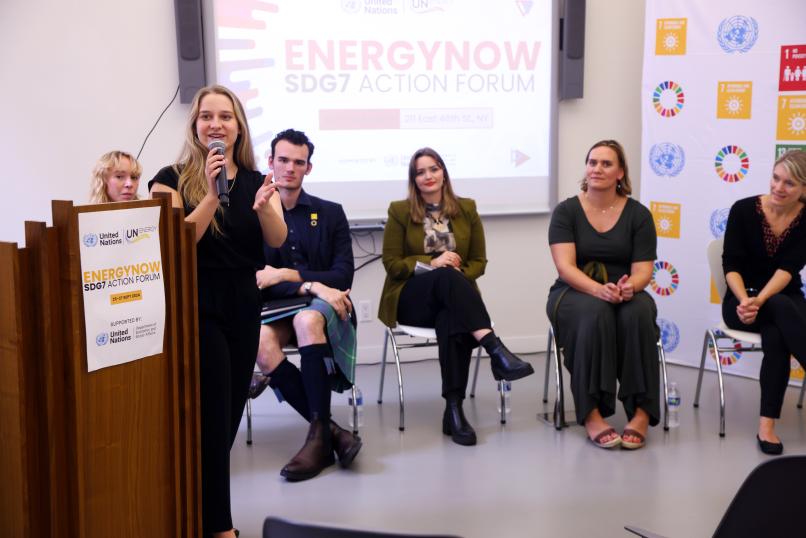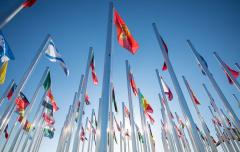Youth and gender call for greater inclusion in energy transition during UN General Assembly
On 27 September 2024, on the sidelines of the UN General Assembly, Sustainable Energy for All (SEforALL) convened a dynamic intergenerational panel at the ENERGYNOW SDG7 Action Forum, focusing on the pivotal role of young women in driving the global energy transition. The session, titled, "Mainstreaming Gender & Youth for SDG7: Challenges & Opportunities for Young Women Entering the Workforce," underscored the pressing need to bridge gender gaps and create pathways for youth in the energy sector.
With clean energy jobs projected to rise to 30 million by 2030 and 42 million by 2050, the potential for growth is vast. Yet, women remain underrepresented, making up only 32% of the global renewable energy workforce, according to International Renewable Energy Agency (IRENA). The panel emphasized the need for gender- and youth-responsive policies to unlock the full potential of the energy workforce.
Key insights: Transforming the energy workforce
The panel featured a keynote address by Fanny Missfeldt-Ringius from the Energy Sector Management Assistance Program (ESMAP), who underscored the importance of vocational training for young women in STEM fields. She noted that "only 60% of the jobs created by the energy transition will require post-secondary degrees," stressing the need for diverse educational pathways to meet the growing demand for skilled workers in the sector.
Asma Rouabhia of the SDG 7 Youth Constituency delivered a stirring call to action: "We need your leadership, your commitment, and your courage to drive forward the energy transition." She outlined four key priorities: accessibility, global leadership platforms, mentorship, and gender- and youth-responsive policies to ensure that youth, especially young women, are empowered to lead in the sector.
Panel discussion: Bridging the gap in the energy sector
Moderated by Grace Young of Student Energy, the expert panel brought together a diverse group of leaders who are paving the way for young women in the energy sector. They shared bold, actionable insights on overcoming existing barriers and unlocking opportunities for the next generation.
- Arunima Sen from the We Are Family Foundation called for an intersectional and intergenerational approach, emphasizing that inclusivity is essential for an equitable energy transition. She shared her personal experience of being in rooms where “decisions are being made for [her],” advocating instead for the direct inclusion of youth voices in shaping the future of energy.
- Jessika Trancik from MIT highlighted that jobs in renewable energy extend beyond technical roles, saying, “There is a lot of work to be done on everything that will allow that hardware to work together to provide a working energy system,” referring to what she calls soft technology. These roles open opportunities for young women to lead in various capacities within the sector.
- Ciara Remerscheid from Shortlist emphasized the transformative impact of job access through initiatives like Women for Green Jobs, which has created 565 new jobs for women. She remarked, “You do not need a degree to do these jobs; you need a bit of vocational training or some type of credential,” showcasing how accessible training can empower women and significantly increase their earning potential.
- Laura Hofmann from CDP emphasized the importance of transparency and accountability in the private sector, underscoring the need for standardized and comparable data to track progress and ensure growth opportunities for women in the sector, stating “We cannot manage what we cannot measure.”
- Josh Oxby from the SDG 7 Youth Constituency concluded with a powerful reminder of the ongoing youth-led energy transition, asserting that "there is a youth- and female-led energy transition happening right now," calling for commitment and courage from young leaders.
Skills for the energy workforce: What young women need to thrive
A key takeaway from the panel was the recognition that young women entering the energy sector need more than just technical knowledge—they must develop a combination of hard and soft skills to succeed and thrive in this evolving field.
Effective communication, collaboration, adaptability, a broad technical expertise, and strong networking abilities are essential for success.
Equipping women for the energy transition
This event underlined the vital role that young women will play in achieving a just energy transition and advancing progress toward SDG7. SEforALL’s commitment to fostering a more inclusive workforce is already in motion, with initiatives like the STEM Traineeship programme empowering women in Kenya, Ghana, Sierra Leone, and Panama to gain the technical and interpersonal skills needed for success.
With young women poised to lead in this evolving landscape, their participation is essential – not only for their own futures but also for achieving sustainable energy goals.

